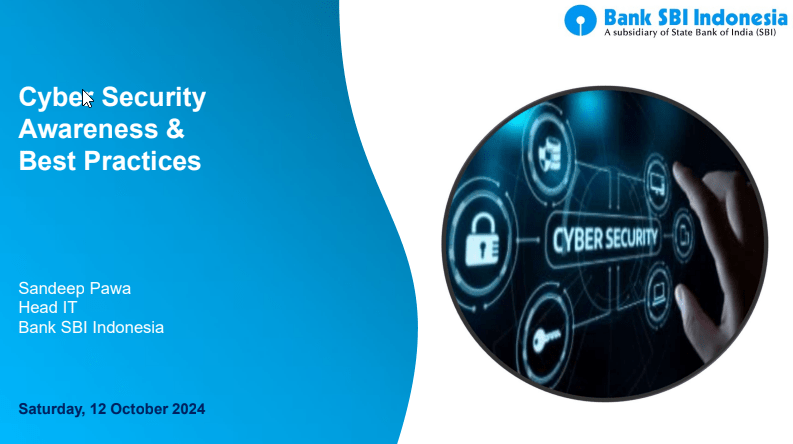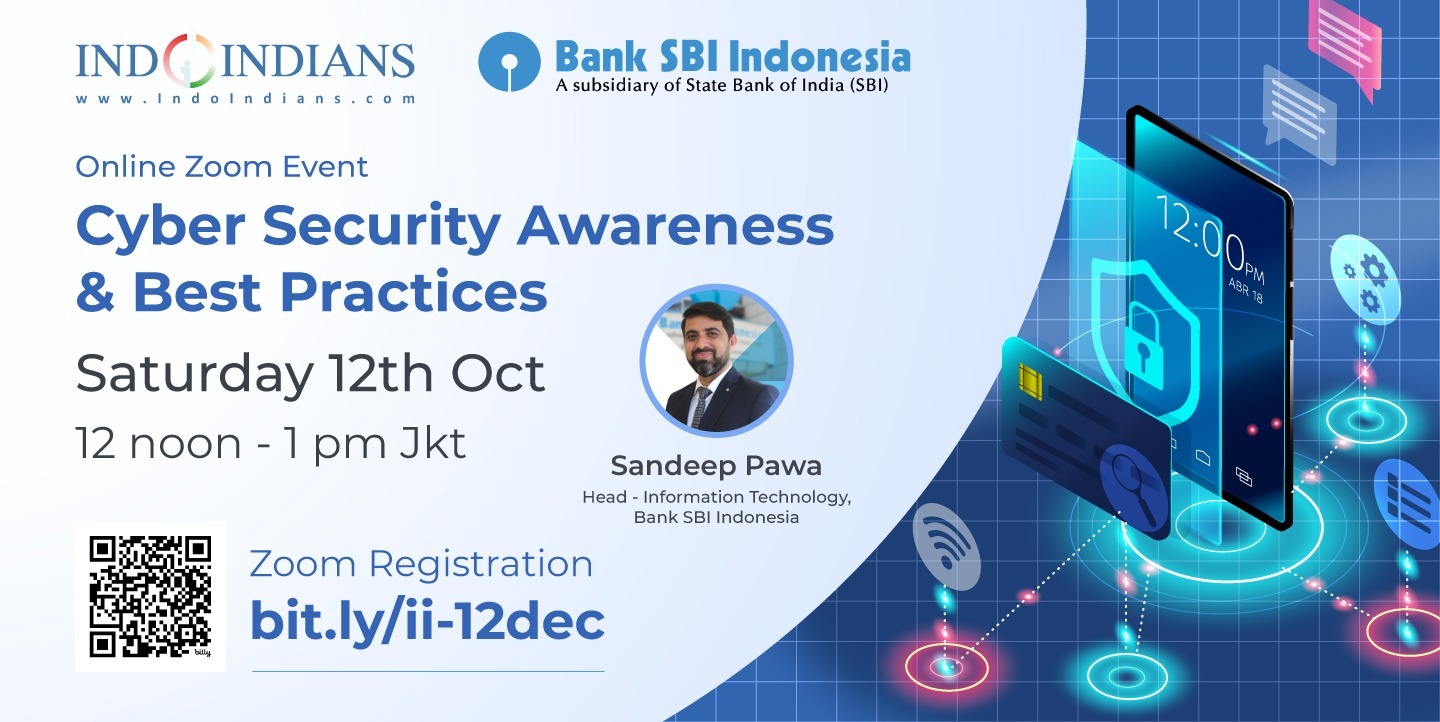Event Report: IndoIndians X SBII Online Event – Cybersecurity Awareness & Best Practices in Banking
Indoindians, in collaboration with Bank SBII, hosted an insightful online session on Cybersecurity Awareness and Best Practices in Banking. The event focused on current cybersecurity trends, threats, and precautionary measures, emphasizing the growing importance of protecting financial data in an increasingly digital world. Discussions covered key areas such as phishing attacks, social engineering, app fraud, and best practices for maintaining digital security in banking.
Akash Damniwala, President Director of Bank SBII facilitated the online event with presenter Sandeep Pawa, Head – IT, Bank SBI Indonesia
Key Takeaways and Actionable Insights:
- Secure Passphrases:
Use secure passphrases instead of traditional passwords, and change them regularly to minimize the risk of unauthorized access. - Review Mobile App Permissions:
Regularly review and update permissions for critical apps on your mobile devices to avoid unnecessary data exposure. - Report Suspicious Activity:
Report any suspicious emails or cyber threats to your corporate IT department immediately to prevent potential security breaches. - Read Emails and Messages Carefully:
Carefully read all emails and messages to verify their validity. Pay attention to email addresses, spelling errors, and inconsistencies to avoid phishing attacks. - Avoid Suspicious Downloads and Links:
Do not download or click on any suspicious files, links, or attachments, as they may lead to malware or phishing attacks. - Change ATM PINs Regularly:
Change your ATM PINs periodically to reduce the risk of fraud and ensure account security.
Download cybersecurity booklet issued by Bank SBII here >>
Cyber Fraud Trends and Global Impact:
The presentation highlighted the increasing trend of cyber frauds, affecting not just individuals but also government agencies and the financial sector. Examples from Indonesia, India, and other countries underscored the global nature of the threat:
- Indonesia is ranked as the 10th most targeted country for cyber-attacks, with a recent ransomware attack on the National Data Center.
- Globally, countries like Singapore and parts of Europe have experienced significant cyber fraud incidents.
- India experiences 3,000 financial cybercrimes daily, amounting to $3.6 billion annually.
These statistics show that cyber fraud remains a serious and pervasive issue, and vigilance is crucial.
Precautions Against App and Phishing Fraud:
Participants were warned about the risks of downloading apps from unauthorized sources and advised to use trusted platforms like the Apple Store or Google Play Store. A special caution was issued regarding screen overlay attacks, where malicious apps record sensitive data. The presentation also covered common fraud types such as:
- Remote access frauds
- Phishing attacks
- App banking frauds
Best practices to avoid these risks include avoiding clicking on suspicious links and ensuring mobile banking apps are downloaded only from trusted sources. Additionally, eSIM technology has been useful in reducing SIM swapping frauds.
Social Engineering and AI Fraud Prevention:
The event emphasized the increasing sophistication of social engineering and AI-based frauds, with attackers often exploiting personal information from social media. Participants were advised to:
- Avoid sharing passwords, account details, or OTPs with anyone.
- Keep social media profiles private to minimize the risk of personal information being used against them.
- Be cautious when sharing KYC or sensitive information, especially with strangers or over unsecured platforms.
The importance of privacy and security in the digital world was reiterated, with participants encouraged to report suspicious activities to authorities.
Phishing Attacks: Tactics and Defense:
Phishing remains a prominent threat. Participants were advised to carefully verify the authenticity of emails, checking for inconsistencies such as incorrect email addresses or spelling errors. Additional best practices include:
- Avoid clicking on suspicious links or attachments.
- Use strong, unique passwords for different accounts.
- Delete and report phishing emails to IT or security teams immediately.
ATM Security and Cyber Fraud Prevention:
Key recommendations for ATM and card security included:
- Never share personal information or PINs, and regularly change ATM PINs.
- Use tools like the SBI Yono App to set card limits and control usage.
- Avoid engaging in transactions involving QR codes or job scams and be wary of public Wi-Fi or unfamiliar websites.
- Strong passwords, biometric authentication, and regular antivirus updates were emphasized as important security practices.
Fraud Reporting: In the event of a cyber fraud, participants were encouraged to act quickly to report the incident, increasing the chances of fund recovery.
Mobile Banking and Spam Prevention:
The event also covered the importance of separating mobile banking from other risky activities, such as gaming, to minimize security risks. Concerns about spam emails were discussed, with a recommendation to remain vigilant and avoid clicking on suspicious links. A personal story shared by a participant reinforced the need for attentiveness when using ATMs abroad.

The session concluded with a discussion on the risks posed by hidden cameras at ATMs and the increasing use of fraudulent video calls. Verifying the identity of individuals in sensitive situations, especially involving financial transactions, was emphasized.
The IndoIndians X Bank SBII Cybersecurity event provided valuable insights into current cyber fraud trends and effective practices for maintaining digital security. Participants left with actionable steps to enhance their cybersecurity efforts and safeguard their financial assets.
It is critical to remain vigilant, review security practices regularly, and report any suspicious activities to relevant authorities or IT teams. This event reinforced the importance of taking proactive steps to protect digital and financial well-being in an evolving cybersecurity landscape.
 Expert Speaker: Mr Sandeep Pawa, Head – IT, Bank SBI Indonesia
Expert Speaker: Mr Sandeep Pawa, Head – IT, Bank SBI Indonesia






